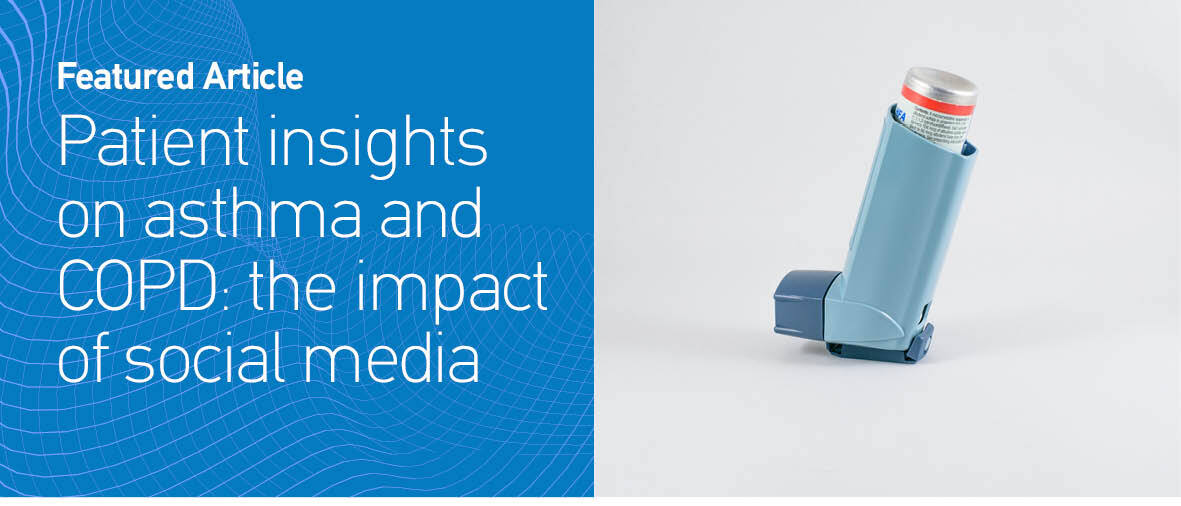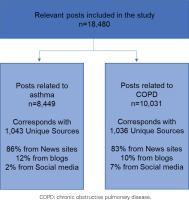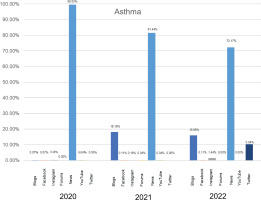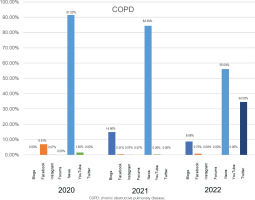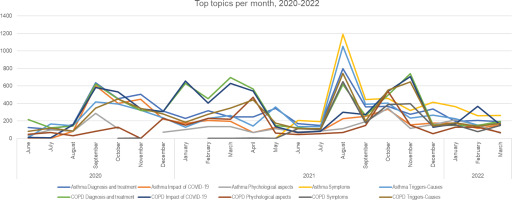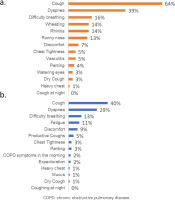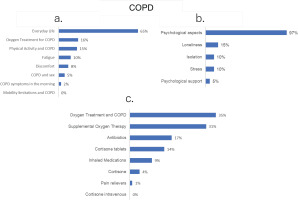INTRODUCTION
Asthma and chronic obstructive pulmonary disease (COPD) are obstructive pulmonary diseases that affect millions of people worldwide. Asthma is a serious global health problem with an estimated 300 million affected individuals. COPD is one of the major causes of chronic morbidity, the 3rd leading cause of death1 and one of the major public health problems worldwide2.
The internet through social media interactions, including online forums, blogs and social networks, has transformed the communication channels for people, in general, and for patients, in particular3. The definition of ‘social media’ generally refers to Internet-based tools that allow individuals and communities to communicate and share information in real time4-6.
The rapid development of social media and the need for effective communication have revealed multiple new uses in the face of emerging health risks7. Social media offer an online platform for conversations around health topics3 and is increasingly being used as a tool to disseminate and communicate information on diseases and health interventions, to promote awareness, and to support health campaigns and medical education3,7,8. Studies have shown the feasibility of using social media and such online interactions to investigate various health-related issues3,9,10. This can be performed through social media listening (SML), which provides an opportunity to track behaviors and interactions of patients, and to understand values and expectations about their disease condition and its management3.
In the present research, we utilized SML to describe patients’ perspectives and insights on symptoms, daily life aspects and treatment associated with asthma and COPD.
METHODS
Study design and data source
A comprehensive search was performed on the social media platforms (news sites, blogs, forums and social media) for Greek language content posted online between June 2020 and March 2022, to evaluate asthma and COPD-related posts using predefined search terms (Supplementary file Table 1). Data and text were collected through an online platform (PaloPro) from all public and ‘open’ sources and textual content was analyzed. Table 1 provides a glossary of specific terms used.
Table 1
Glossary
Each post was reviewed to evaluate the mention of different parameters. Not every post may have mentions of all parameters such as symptoms, treatment etc. Nevertheless, each post has a mention of at least one parameter. Mentions of symptoms, daily life and treatment were aggregated and reported.
Ethical considerations
All data utilized and presented here were obtained from publicly accessible sources without accessing passwordprotected information. Privacy of patients was respected, and caution was taken in using the information posted by them: all online content was anonymized, complying with the data privacy obligations.
Statistical analysis
For the content collected, only aggregated qualitative findings are reported. Manual curation was used to analyze and map psychological aspects expressed by users. All data were analyzed using descriptive statistics. Categorical data were described using number of posts and/or percentages.
RESULTS
Number of mentions and sources of posts
Of the 18480 posts considered for the analysis, 8449 were designated as posts related to asthma and 10031 as posts related to COPD (Figure 1).
Regarding asthma, in 2020 (June to December), 2688 mentions were from 493 unique sources, 4859 in 2021 were from 750 unique sources, and 902 in the first trimester (Q1) of 2022 were from 402 unique sources. The most common source of the posts was news sites (86%), followed by blogs (12%) and social media (2%) (Figures 2 and 3, and Supplementary file Table 2). In 2020, all mentions came from news sites. In 2021, the vast majority came from news sites (81%) and blogs (18%). In 2022 (Q1), 72% of asthma mentions came from news sites, followed by 16% from blogs and 10% from Twitter.
For COPD, in 2020 there were 925 mentions, coming from 556 unique sources. In 2021, there were 6046 coming from 830 unique sources, and 1060 in the first semester (Q1) of 2022 coming from 626 unique sources. Overall, the vast majority of mentions about COPD were generated by news sites (83%) and secondly by blogs (10%). A few mentions came from Twitter (4%) and Facebook (2%) (Figures 2 and 3, and Supplementary file Table 2). In 2020, 91% of the mentions came from news sites, while 7% came from Facebook and 2% from YouTube. In 2021, 84% of the mentions came from news sites and 15% from blogs. Finally, in the first trimester of 2022, news sites had the highest buzz (56%) followed by Twitter (35%). Detailed distribution of asthma and COPD related post sources across the years is illustrated in Figures 2 and 3, respectively.
Topics discussed during the year
During the covered period, the topics with the highest buzz for asthma were diagnosis and treatment with 6741 mentions (23%), triggers and causes with 6003 (21%), and impact of COVID-19 with 4253 (15%). Mentions of asthma symptoms reached 14%, while topics regarding patients’ everyday lives and psychological issues were mentioned by 9% each. Finally, 8% of mentions were about asthma and its correlation to allergies (Figure 4b).
Figure 4
Topics with the highest buzz for asthma (N=8449) and COPD (N=10031) per year (a,c) and in total (b,d)
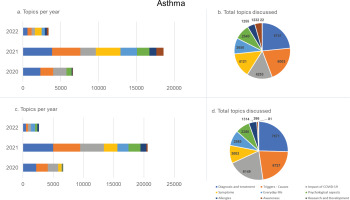
In 2020 (June to December), the top topics with the highest buzz were diagnosis and treatment (2300), impact of COVID-19 (1759), and triggers and causes (1695) (Figure 4a). The number of mentions of these three topics increased remarkably in September (Figure 5), probably due to the increase in seasonal viral infections at this time of the year. Indeed, concerns have been raised by the scientific community about the effects of COVID-19 on children and vulnerable populations associated with asthma, in addition to the need for seasonal flu vaccination for COPD and patients with asthma.
In 2021, mentions were mostly about diagnosis and treatment (3848), triggers and causes (3747), and symptoms (3228) (Figure 4a). Those topics’ buzz rapidly increased in August 2021 (Figure 5) due to the wildfires in Greece and discussions on how air pollution can affect people with asthma and COPD. Finally, in 2022 (Q1), the top topics were symptoms (889), diagnosis and treatment (593), and triggers and causes (561) (Figure 4a). Furthermore, mentions about symptoms were first in buzz during Q1 (Figure 5).
The topics with the highest buzz for COPD, were diagnosis and treatment with 7671 mentions (25%), impact of COVID-19 with 6727 (22%), and triggers and causes with 6149 (20%) (Figure 4d). In 2020 and 2021, the topics mentioned above remained the most discussed (Figure 4c). Further analysis on the topics discussed per month during the study period are presented in Figure 5.
In September 2020, we observed a peak in diagnosis and treatment (622) and the impact of COVID-19 (581). The number of mentions for these topics increased remarkably in September 2020. The primary issues highlighted were the awareness issues and worries about the COVID-19 symptoms and the scientific community’s call for the seasonal flu vaccine for COPD and patients with asthma (Figure 5).
Off note, in March 2021, mentions about diagnosis and treatment and the impact of COVID-19 increased due to the start of COVID-19 vaccination. In August 2021, triggers and causes increased due to the wildfires in Greece and how air pollution can affect people with asthma and COPD (Figure 5). Further, mentions of COPD, were widely reproduced and increased in November 2021, as news sites talked about how COPD and other chronic diseases affect the number of COVID-19 hospitalized patients. In addition, there were articles related to past research about the correlation between smoking and COPD.
Finally, in February 2022, the everyday life topic significantly increased to 366 mentions because a Twitter user expressed that COPD treatment is not affordable for patients in Greece (Figure 5).
Perceptions of symptoms and exacerbations
Based on 4121 mentions of symptoms regarding asthma, the most reported symptoms were cough (64%), dyspnea (39%) and difficulty in breathing (16%) (Figure 6a). Exacerbations/flare-ups were also mentioned at a rate of 13%.
As far as COPD symptoms are concerned, based on 2380 mentions, the most commonly reported symptoms were cough (40%), dyspnea (29%) as well as difficulty in breathing (13%) (Figure 6b). Exacerbations/flare-ups were mentioned at a rate of 22%.
Quality of life
When analysis was focused on SML reactions on aspects of quality of life (QoL) affected by the disease, work (58% of the total 2650 mentions) and exercise (40%) were the most common aspects impacting everyday life due to asthma (Figure 7a). Psychological aspects and fatigue (90% and 21%, respectively, of the total 2540 mentions) were the most perceived themes affecting psychological status (Figure 7b), while supplemental oxygen therapy, pain relievers and antibiotics (25%, 19% and 18%, respectively, of the total 6741) were the most reported themes related to asthma therapy (Figure 7c).
Figure 7
Mention of aspects pertaining to: a) everyday life, b) emotional status, and c) treatment, related to asthma (N=8449)
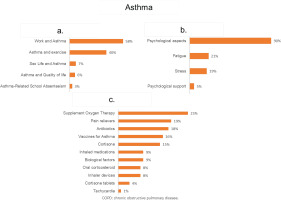
Daily routine (65% of the total 2585 mentions) and oxygen treatment for COPD (16%) were the most common aspects impacting everyday life due to COPD (Figure 8a). Psychological aspects and loneliness (97% and 15%, respectively, of the total 3003 mentions) were the most perceived themes affecting psychological status (Figure 8b), whereas oxygen treatment for COPD and supplemental oxygen therapy (35% and 31%, respectively, of the total 7671) were the most reported themes related to COPD therapy (Figure 8c).
DISCUSSION
SML offers a useful tool to inform and engage diverse audiences on a wide range of public health issues, as well as monitor opinions and behaviors on health topics11-13. Collecting patient experience data provides important insights on the impact of disease on the patient’s daily life, and represents an opportunity to listen to the patients’ voices14 as well as improve communication between the patients and healthcare professionals15. According to a recent study, it has been claimed that social media along with a range of eHealth applications may help allergists to closely monitor clinical symptoms and adherence16. Additionally, they can act as source of easy to collect real-time data in evolving future eHealth technologies, but also as an instrument for patients to participate in meetings of organizations.
The findings from our analysis suggest that patients with asthma and COPD actively share experiences and seek information on social media platforms. The results also indicate that the most reported topics with the highest buzz for asthma and COPD were diagnosis and treatment, triggers and causes as well as impact of COVID-19, which can be attributed to the fact that the research was conducted during COVID-19 period.
Our analysis results reveal that cough, mucus and shortness of breath appeared to be the most discussed symptoms in online posts by individuals with asthma and COPD. Previous studies have shown that breathlessness, coughing and mucus are the highest ranked symptoms among asthma and COPD patients14,17. SML in patients with asthma and COPD indicates that relief from cough, dyspnea and shortness of breath would possibly be the most valuable aspects of disease management according to the patients’ perspectives.
These findings suggest that cough is a frequently mentioned clinical trait in asthma and COPD, but is not adequately controlled by conventional treatments. Indeed, the impact of cough is not well addressed in different assessment tools, such as the Asthma Control Test (ACT) or Asthma Control Questionnaire (ACQ)18,19. Ιt is worth mentioning that a study assessing the content validity of a cough and sputum assessment questionnaire in COPD patients, compared to published qualitative patient data from online SML studies, has suggested that online qualitative data can be used as a promising new additional tool to support, rather than replace, qualitative interviews and focus groups, playing a key role in understanding and documenting content validity of Patient Reported Outcome Measures over time20.
Another study conducted by Freeman et al.21, indicated that online content can be a rich source of insights about the lived experience of COPD. More particularly, this study proved that potential neural networks using social media content can offer knowledge regarding the quantitative, patient-focused understanding about how each distinct COPD symptom – even if it is not the most frequently reported, such as mucus hypersecretion – may contribute to the estimation of chronic and acute respiratory illness’ burden.
Patients with asthma and COPD face a restricted life and poor QoL3. Based on our findings, work and exercise were the most common aspects impacting everyday life, while psychological aspects and fatigue were the most perceived themes affecting psychological status due to asthma. On the other hand, everyday life and oxygen treatment for COPD were the most common aspects impacting everyday life while psychological aspects and loneliness were the most perceived themes affecting psychological status due to COPD. Poor QoL as a finding is confirmed by numerous of studies22-25 indicating that health-related quality of life (HRQoL) of patients with COPD and asthma is significantly lower than that in the general population and is associated with gender, education level and financial status, duration of symptoms, age at onset of symptoms, disease stage, degree of dyspnea, and co-morbidities. Moreover, untreated patients with COPD suffer from poorer quality of sleep compared to treated subjects25. Real-world evidence has recently demonstrated that biologic treatment resulted in reduction of asthma symptoms based on questionnaires focused on QoL of asthma patients. A greater percentage of patients receiving biologics compared to those not on biologics, seem to feel more relaxed mentally and less stressed about occurrence of exacerbation22.
There is an evolving framework for integrating patient preference measurements into the drug development, regulatory, and reimbursement decision-making processes, and multi-stakeholder initiatives are actively filling this gap26. Studies such as SML, are relatively new methods for generating patient insights, which may serve as an important input to decision making, if considered early in the drug development process27.
Nevertheless, social media platforms are informal and unregulated channels for information exchange, leading to varied quality and consistency28. Additionally, public education is essential to increase awareness among the general public, patients, and health professionals about the implications of using social media28.
Limitations
To the best of our knowledge, this is the first SML analysis evaluating patients’ perspectives on asthma and COPD in Greece. However, our findings need to be interpreted with caution due to inherent limitations of the SML approach. First, the legitimacy of the views gathered from online posts cannot be confirmed and the diagnosis of asthma and COPD was based on the verbatim assessment for each post. Moreover, the study was performed, and data were selected during the COVID-19 period, and the majority of data come from news websites, which were either healthcare specialized or not. Second, we acknowledge that in our study, the term ‘source’ encompasses both websites and individual posts on social media platforms such as Twitter. However, it is important to note that the credibility and review processes of these sources can vary significantly, with websites often undergoing more rigorous review compared to social media posts. Third, we recognize that news websites and posts from patients or individuals from the public hold different levels of significance and should be analyzed separately. Additionally, within news websites, the distinction between a journalist’s mention in an article and a verbatim quote from an interview reported by a journalist is also acknowledged, as they may carry different implications.
Future research could benefit from a comparative analysis of content across different types of sources, such as patients, the public, and journalists, to better understand the varying perspectives and significance each source brings to the topic.
CONCLUSIONS
Asthma and COPD impose a significant burden of impaired QoL in patients that affects multiple aspects of daily life. This highlights patients’ need for more efficacious treatment options and improvements in the education, diagnosis and management of their disease. Patients with asthma and COPD actively share experiences and seek information on social media. The evidence suggests that SML strengthens our understanding of patient experiences and their unmet needs. Monitoring asthma- and COPD-related posts provides real-time information on the impact of disease on the patient’s daily life and may provide important insights that can be used to inform decision making and to improve disease management.

